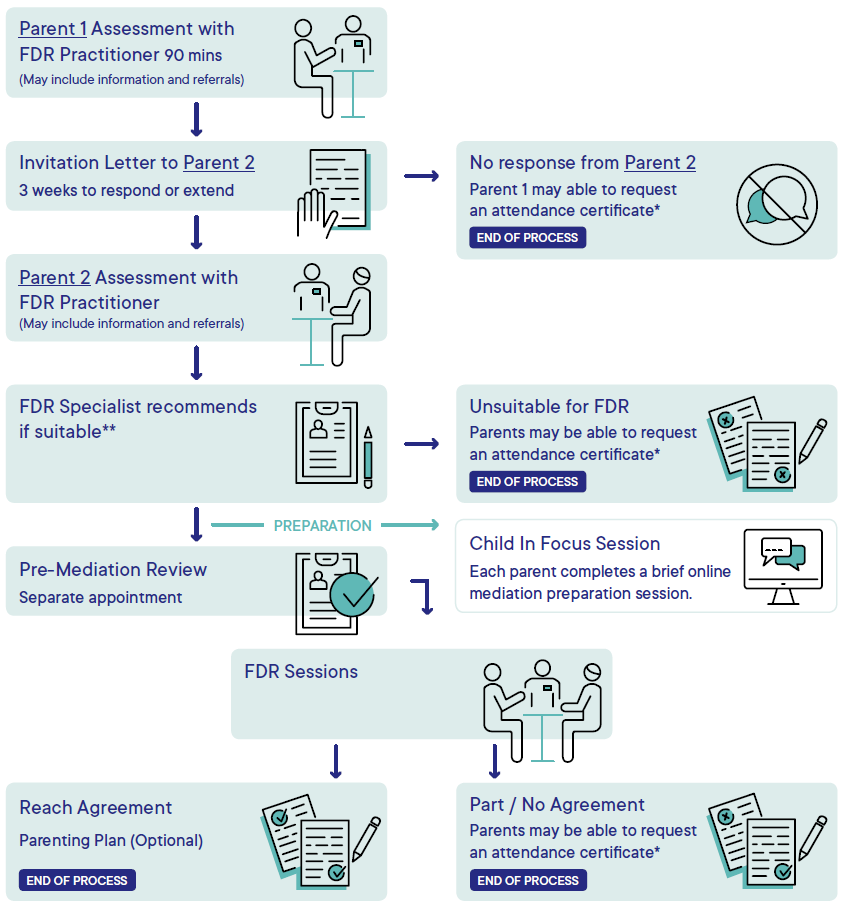The Process of Family Dispute Resolution
Watch below short video where FDR Team Leader explains briefly how we help separating families through Family Dispute Resolution mediation.
What can you expect?
Initial Appointment
When you engage with BPA for family dispute resolution, you will be booked in for an initial one on one appointment with one of our Practitioners. The Practitioner will meet with you and gather some information about you, your children, and your relationship with the other parent. If appropriate to do so, they will invite the other parent to participate. If the other parent is willing to engage in the service, the Practitioner will also have a separate one on one appointment with them.
Assessment
Prior to booking in a mediation session, the Practitioner will assess the appropriateness of family dispute resolution for your situation as required by the Family Law Act (1975). If the matter is appropriate for FDR to proceed, the Practitioner will decide how they will run the session and whether the session will take place in person or via video or telephone. The Practitioner will also assess which format will work best for your matter to ensure all participants can effectively participate and maximise the chances of reaching an agreement. The session could run in a ‘shuttle’ format where the FDRP takes content back and forth between the participants separately or it may run in a joint format where the FDRP has discussions with you both together.
Pre-Mediation
If your matter is appropriate, the FDRP will contact you and schedule a time for a 2-hour mediation session and a pre-mediation review call. The pre-mediation review call is a 30-minute one on one appointment that takes place before the mediation session. This gives the Practitioner an opportunity to prepare you for the session, talk you through the process and answer any questions you may have. They will talk to you about what you would like to discuss with the other parent and explore what arrangements you think will be in the children’s best interests going forward. The law requires that FDRP’s assess appropriateness for mediation throughout the process.
The Mediation Session
At the start of your session, the FDRP will ask you for your ‘agenda items’. These are topics you would like to discuss with the other parent, and can include matters such as:
- care arrangements
- arrangements for special occasions
- any other issues that you feel needs to be addressed with the other parent in relation to the children
Agenda items are only tabled for discussion if both parties are willing to discuss them or if there is willingness to hear what the other parent has to say about a particular issue. There is no pressure to respond or to reach an agreement. The FDRP will assist with exploring options and helping parents to consider proposals based on their family’s needs and their children’s age and stage of development. More than one 2-hour session may be required to work through the agenda items.
Child in Focus
Each parent will be provided with an online link to a Child in Focus session. This is designed to help parents focus on their children’s needs and understand the Family Dispute Resolution process. We encourage all parents coming through our service to complete this session as part of their preparations.
Parenting Plans
A Parenting Plan can be drafted by the FDRP post session/s which will reflect what has been agreed to by both parents during mediation. The Parenting Plan becomes active when signed and dated by both parents, but it is not legally binding in the way a court order or consent order is. A lawyer can give advice about how to turn a parenting plan into consent orders.
Download the Parenting Plans – Fact sheet.
What is a parenting plan?
Family Dispute Resolution can help parents negotiate a written parenting agreement, provide an opportunity for parents to review their existing arrangements or discuss important issues in relation to the children such as schooling, interstate/overseas travel, medical care etc. Parenting Plans can be adapted to suit your families’ circumstances and meet your children’s needs. They will often include:
- The time children will spend and the communication they will have with each parent.
- The time the children will spend and the communication they will have with significant others who are important to them, such as grandparents and extended family.
- The activities the children will do with each parent (e.g., sports, homework, music) and their participation in extracurricular activities.
- Arrangements for school holidays and special occasions, such as birthdays, religious or cultural events, graduation days.
- How parents will communicate about the children’s day to day needs and make decisions about longer term issues.
- An agreed process for reviewing the Parenting Plan as the children get older and their needs change.
- How parents will resolve disputes going forward and ensure the children are protected from conflict.
As children grow, their needs change, and the circumstances of parents can change. Parenting Plans need to be practical while prioritising the children’s needs, best interests, and wellbeing.
Post Mediation Follow Up
After your matter is concluded, we may contact you in approximately 3-6 months’ time via a short email with a questionnaire to follow up on your progress.




